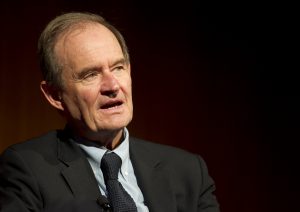
(Photo by Jay Janner-Pool/Getty Images)
David Boies had a really shitty Tuesday — even worse than the Tuesday the Republican party racked up. In fairness, it was deserved — that’s what you get when you admit to participating in the scheme of silence and retaliation that allowed an alleged serial sexual harasser and abuser like Harvey Weinstein to operate for years without any consequences. Oh, and he also got fired by the New York Times.
For those of you who missed the Biglaw gossip yesterday, here’s the quick version: Boies was involved in hiring some… aggressive investigators on behalf of Weinstein. That investigation was charged with creating files on “targets” — women who might accuse Weinstein of sexual assault and the journalists who might write about it. The New Yorker piece that details the extent the Weinstein camp went to to avoid public exposure — and Boies’s role in it — is well worth the read.

7 Key Trends In Law Firm Rate Negotiations
And how to navigate them in 2026.
For legal ethicists, one of the more interesting aspects of the whole debacle is that while Boies was part of the effort to actively kill the New York Times piece detailing the allegations against Weinstein, he was also repping the Times in other matters. Yeah, the Times has not taken kindly to… any of this information, calling it a “grave betrayal.”
Late yesterday, the Times announced it had “terminated its relationship” with Boies Schiller Flexner, calling the Weinstein investigation “reprehensible”:
We never contemplated that the law firm would contract with an intelligence firm to conduct a secret spying operation aimed at our reporting and our reporters. Such an operation is reprehensible, and the Boies firm must have known that its existence would have been material to our decision whether to continue using the firm. Whatever legalistic arguments and justifications can be made, we should have been treated better by a firm that we trusted.
Ouch.

Ready for What’s Next: 5 Ways to Strengthen Economic Resilience
Get five practical tips to spot cash flow red flags early, speed up payments, track spending in real time, and build stronger client trust through clear, transparent billing—download the ebook.
As one might imagine, this is a PR nightmare for Boies. His name used to be associated with Bush v. Gore, marriage equality, and high salaries, and now it will forever be linked with enabling sexual harassment. That’s quite the hit.
Boies isn’t staying quiet. His strategy appears to be giving more information to provide the full color and context of his work for Weinstein. Below is a firm-wide email sent to BSF employees, which while long, provides Boies’s side of the events and engagements in question:
Many of you have asked for clarification of my, and the Firm’s, role related to Harvey Weinstein and recent stories concerning the hiring of private investigators. You are entitled to clarification and it is important to me to make clear what happened.
Mr. Weinstein was a client of mine; he is no longer a client of mine or of the Firm.
In the first half of this year, Mr. Weinstein learned that the New York Times was considering publishing a story alleging that many years ago Mr. Weinstein had raped an actress. Mr. Weinstein hotly disputed that allegation.
I told Mr. Weinstein at that time that neither I nor the Firm would represent him in this matter, and he hired several other lawyers to represent him.
I also told Mr. Weinstein that the Times story could not be stopped through threats or influence; the only way that the story could be stopped was by proving it was not true.
Mr. Weinstein, together with the lawyers representing him, selected private investigators to assist him and drafted a contract. He asked me to execute the contract on his behalf. I was told at the time that the purposes of hiring the private investigators were to ascertain exactly what the actress was accusing Mr. Weinstein of having done, and when, and to try to find facts that would prove the charge to be false and thereby stop the story.
I did not (nor did the firm) select the investigators (at least one of which had been used by Mr. Weinstein previously) or direct their work; that was done by Mr. Weinstein and his other counsel.
While I told Mr. Weinstein that I was not in a position to represent him on these issues, his request to contract with investigators seemed at the time, like a reasonable accommodation for a longtime client. I regret having done this. It was a mistake to contract with, and pay on behalf of a client, investigators who we did not select and did not control. It was not thought through, and that was my mistake. I take responsibility for that.
I also want to address the issue of whether there was a conflict of interest with the Firm’s representation of the New York Times. First, when we were engaged by the Times we made clear that we needed to be able to continue to represent clients adverse to the Times on matters unrelated to the work we were doing for the Times. Our Engagement Letter, countersigned by the Times, expressly states:
“We have explained and you have agreed that as a result of the types of clients the Firm advises and the types of engagements in which we are involved, we may be requested to act for other persons on matters which are not substantially related to the Engagement, where the interests of the other persons, and the Firm’s representation of them, may be against the client’s, including adversity in litigation.”
Second, despite the language in our Engagement Letter, I told Mr. Weinstein that we would not represent him in this matter.
Third, because I perceived the investigators’ work as trying to ascertain the exact charges against Mr. Weinstein and to develop facts that would prove the charges untrue, I thought at the time that was an appropriate endeavor.
Had I known at the time that this contract would have been used for the services that I now understand it was used for, I would never have signed it or been associated in any way with this effort. I have devoted much of my professional career to helping give voice to people who would otherwise not be heard and to protecting the rights of women and others subjection to oppression. I would never knowingly participate in an effort to intimidate or silence women or anyone else, including the conduct described in the New Yorker article. That is not who I am.
If any of you have further questions, please let me know and I will try to address them.
It remains to be seen how or if this will change the gossip swirling about Boies’s role. But it does show just how easily lawyers, trying to make accommodations for clients, can get embroiled in their mess.
 Kathryn Rubino is an editor at Above the Law. AtL tipsters are the best, so please connect with her. Feel free to email her with any tips, questions, or comments and follow her on Twitter (@Kathryn1).
Kathryn Rubino is an editor at Above the Law. AtL tipsters are the best, so please connect with her. Feel free to email her with any tips, questions, or comments and follow her on Twitter (@Kathryn1).